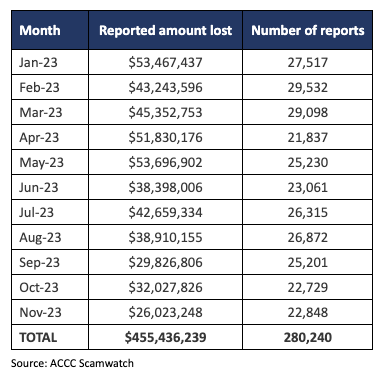Over $455 million lost to scams this year

RateCity.com.au is advising Australians to be vigilant this silly season after its recent survey found more than half of Australians (53%) have either been a victim, or know someone who has been a victim, of a scam this year.
The results come as authorities, including the Australian Federal Force, warn Australians to watch out for scams heading into the Christmas and holiday season. RateCity.com.au’s survey of 1,000 Australians found 38% of the respondents said they receive a scam attempt at least once a day.
Other recent data from the Australian Competition and Consumer Commission (ACCC) shows Australians lost more than $455 million to scams between January and November 2023.

What can be done against scammers?
The RateCity.com.au survey found one-fifth, or 22%, of respondents are not taking precautions to protect themselves from scams. Also, out of those who had been scammed, only 12% reported the scam to the ACCC. The financial comparison company has warned about leaving an opening for scammers to enter their lives and cause harm, sharing some advice on how to protect oneself.
“You can put out milk and cookies for Santa, but when it comes to scammers, don’t leave the door wide open,” said Sally Tindall (pictured), research director at RateCity.com.au. “Review your privacy settings on social media sites, steer clear of links in unsolicited messages and be on high alert when answering calls from numbers you don’t recognise.”
Other tips include:
- Don’t recognise? Don’t click. Avoid opening any link from an unknown source.
- Never share one-time passwords or your access information.
- When shopping online, be on high alert. Lean towards using retailers you know and trust. Always check the address is spelt correctly.
- Be wary of phone numbers you don’t recognise. If a bank or other business calls you out of the blue, hang up and call them back on the number from their website. If a loved one sends you a text and says they have a new number, call it to see who answers.
- Check your card and bank statements regularly. If you notice any unusual purchases on your statement, report it to your bank.
RateCity.com.au also shared some advice for those who had fallen victim to a scam.
- Contact your bank immediately. They can potentially stop any pending transactions and put a freeze on your account. They will also help with advice on next steps.
- Change your passwords. Use a strong password that a hacker cannot guess easily.
- Spread the word and be on high alert. Talking about scams can help prevent future attacks.
- Monitor your accounts. Keep a close eye on your bank accounts or anything the scammer may have been able to access.
- If your identity has been stolen. Contact IDCARE on 1800 595 160, Australia’s not-for-profit identity and cyber support service.
“If you do get hit by a scam over summer, don’t stick your head in the sand. While you might feel embarrassed the thief got the better of you, reporting it to the authorities and alerting family and friends can help others avoid the same fate,” said Tindall. “Be like Santa’s elves and report everything you hear and see back to the authorities, including the ACCC.”
Have thoughts on this story? Leave a comment below.



